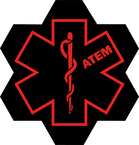RDCR
Remote Damage Control Resuscitation
This short intensive course is designed for the Medical Professional and Medic Instructor working in the Remote, Austere or Tactical Environment. The course examines:
Using knowledgeable and experienced Instructors the students will be taken through the process of DCR and the latest developments and evidence in this sub-specialty.
The Main Effort of this course is to optimise casualty outcome by optimising the performance of the advanced provider.
Topics covered:
Using the latest developments in Evidence Based Medicine (EBM) and guidelines from Expert Faculties, ATEM uses experienced medical personnel to deliver high quality, informed and expert training.
The training on the course delivers the knowledge base via lessons, discussion groups and workshops. With this knowledge fresh in mind the emphasis shifts to the practical demonstration and learning or refreshing these skills with practice and improvement of performance through formative assessment. Using realistic scenarios, students progress in their ability to safely deliver treatment in the extremely challenging remote, austere or tactical environment.
- Factors that optimise outcome
- Understanding Research, Evidence and Evidence Grading
- Training & Learning - improving the cycle
- Human Performance & Stress Inoculation
- Communication, Non Technical Skills & Crew Resource Management
- Understanding errors - why and how they happen and strategies for avoidance
- Remote Damage Control Resuscitation (RDCR) the Skill and the ART
Using knowledgeable and experienced Instructors the students will be taken through the process of DCR and the latest developments and evidence in this sub-specialty.
The Main Effort of this course is to optimise casualty outcome by optimising the performance of the advanced provider.
Topics covered:
- Planning for the delivery of care in the Remote, Austere or Tactical environment
- The importance of structure in the stressful medical environment
- Understanding the importance of the BASIC treatment skills
- Teaching CRITICAL SKILLS
- Basic & Advanced HAEMORRHAGE management
- Basic & Advanced AIRWAY management
- Basic & Advanced RESPIRATION & chest injury management
- Basic & Advanced CIRCULATION and shock management
- Basic & Advanced DISABILITY management
- Basic & Advanced EXPOSURE management
- Drugs given in the RDCR Phase
- Traumatic Cardiac Arrest
- Ultrasound Lab
- Analgesia Lab
- Bridging to Prolonged Care
- Telemedicine
- Lessons learnt from the pointy end
- Realistic scenarios
Using the latest developments in Evidence Based Medicine (EBM) and guidelines from Expert Faculties, ATEM uses experienced medical personnel to deliver high quality, informed and expert training.
The training on the course delivers the knowledge base via lessons, discussion groups and workshops. With this knowledge fresh in mind the emphasis shifts to the practical demonstration and learning or refreshing these skills with practice and improvement of performance through formative assessment. Using realistic scenarios, students progress in their ability to safely deliver treatment in the extremely challenging remote, austere or tactical environment.

Training the BEST for the WORST
